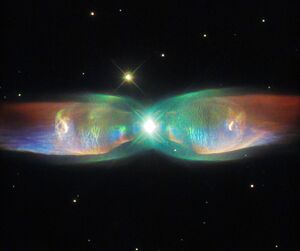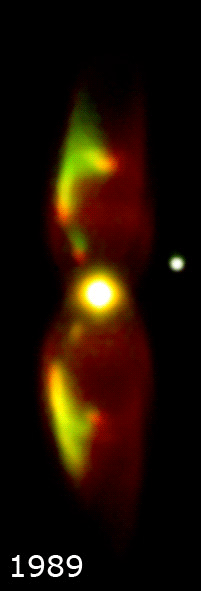Astronomy:M2-9
| Emission nebula | |
|---|---|
| Planetary nebula | |
 M2-9 as taken by the Hubble Space Telescope | |
| Observation data: J2000 epoch | |
| Right ascension | 17h 05m 37.952s[1] |
| Declination | −10° 08′ 34.58″[1] |
| Distance | 2,100 ly (650 pc)[2] ly |
| Apparent magnitude (V) | 14.7[1] |
| Constellation | Ophiuchus |
| Physical characteristics | |
| Radius | 0.7 ly (0.2 pc)[2][n 1] ly |
| Notable features | Bipolar outflow, Bipolar nebula |
| Designations | Twin Jet Nebula,[1] Butterfly Nebula,[1] |
Minkowski 2-9, abbreviated M2-9 (also known as Minkowski's Butterfly, Twin Jet Nebula, the Wings of a Butterfly Nebula, or just Butterfly Nebula) is a planetary nebula that was discovered by Rudolph Minkowski in 1947. It is located about 2,100 light-years away from Earth in the direction of the constellation Ophiuchus. This bipolar nebula takes the peculiar form of twin lobes of material that emanate from a central star. Astronomers have dubbed this object as the Twin Jet Nebula because of the jets believed to cause the shape of the lobes. Its form also resembles the wings of a butterfly. The nebula was imaged by the Hubble Space Telescope in the 1990s.
The primary component of the central binary is the hot core of a star that reached the end of its main-sequence life cycle, ejected most of its outer layers and became a red giant, and is now contracting into a white dwarf. It is believed to have been a sun-like star early in its life. The second, smaller star of the binary orbits very closely and may even have been engulfed by the other's expanding stellar atmosphere with the resulting interaction creating the nebula. Astronomers theorize that the gravity of one star pulls some of the gas from the surface of the other and flings it into a thin, dense disk extending into space.[3] As the central binary orbits with a period of about 86 to 120 years, the wind emitting from the binary changes direction with it.[4]
The nebula has inflated dramatically[5] due to a fast stellar wind, blowing out into the surrounding disk and inflating the large, wispy hourglass-shaped wings perpendicular to the disk. These wings produce the butterfly appearance when seen in projection. The outer shell is estimated to be about 1,200 years old (Schwarz Aspin). File:2003 BUTTERFLY NEBULA SWIRL.oggFile:NEB SWIRL.ogv

Notes
- ↑ Radius = distance × sin(angular size / 2) = 2.1 kly * sin(115″ / 2) = 0.6 ly
References
- ↑ 1.0 1.1 1.2 1.3 1.4 (SIMBAD 2006)
- ↑ 2.0 2.1 (Schwarz Aspin)
- ↑ Lykou, F.; Chesneau, O.; Zijlstra, A. A.; Castro-Carrizo, A. et al. (3 Feb 2011). "A disc inside the bipolar planetary nebula M2-9". Astronomy & Astrophysics (EDP Sciences) 527 (A105): A105. doi:10.1051/0004-6361/200913845. Bibcode: 2011A&A...527A.105L. http://www.aanda.org/articles/aa/abs/2011/03/aa13845-09/aa13845-09.html. Retrieved 10 February 2014.
- ↑ de la Fuente, Eduardo; Trinidad, Miguel A.; Tafoya, Daniel; Toledano-Juárez, Ivan; García-Flores, Samuel (2022). "The symbiotic and bipolar nebula M 2-9: Morphological variability of the collimated ionized wind arising from the core". Publications of the Astronomical Society of Japan 74 (3): 594–601. doi:10.1093/pasj/psac020. Bibcode: 2022PASJ...74..594D.
- ↑ (Nemiroff Bonnell)
- Nemiroff, R.; Bonnell, J., eds (June 12, 2005). "M2-9: Wings of a Butterfly Nebula". Astronomy Picture of the Day. NASA. https://apod.nasa.gov/apod/ap050612.html.
- Nemiroff, R.; Bonnell, J., eds (June 18, 2007). "Monitoring M2-9". Astronomy Picture of the Day. NASA. https://apod.nasa.gov/apod/ap070618.html.
- Hora, Joseph L.; Latter, William B. (1994), "The near-infrared structure and spectra of the bipolar nebulae M2-9 and AFGL 2688: The role of ultraviolet pumping and shocks in molecular hydrogen excitation", The Astrophysical Journal 437 (1): 281–295, doi:10.1086/174995, Bibcode: 1994ApJ...437..281H
- Livio, Mario; Soker, Noam (2001), "The "Twin Jet" Planetary Nebula M2-9", The Astrophysical Journal 552 (2): 685–691, doi:10.1086/320567, Bibcode: 2001ApJ...552..685L, http://adsabs.harvard.edu/cgi-bin/nph-bib_query?bibcode=2001ApJ...552..685L
- Savage, Don (December 17, 1997), "Hubble Witnesses the Final Blaze of Glory of Sun-Like Stars", Space Telescope Science Institute, http://hubblesite.org/newscenter/newsdesk/archive/releases/1997/38/text/
- Schwarz, H. E.; Aspin, C.; Corradi, R. L. M.; Reipurth, B. (1997), "M 2-9: moving dust in a fast bipolar outflow", Astronomy and Astrophysics 319: 267–273, Bibcode: 1997A&A...319..267S, http://adsabs.harvard.edu/cgi-bin/nph-bib_query?bibcode=1997A%26A...319..267S
- SIMBAD (December 22, 2006), Results for PN M 2-9, SIMBAD, Centre de Données Astronomiques de Strasbourg, http://simbad.u-strasbg.fr/simbad/sim-id?protocol=html&Ident=PN+M2-9
Coordinates: ![]() 17h 05m 37.95s, −10° 08′ 34.58″
17h 05m 37.95s, −10° 08′ 34.58″
 |

